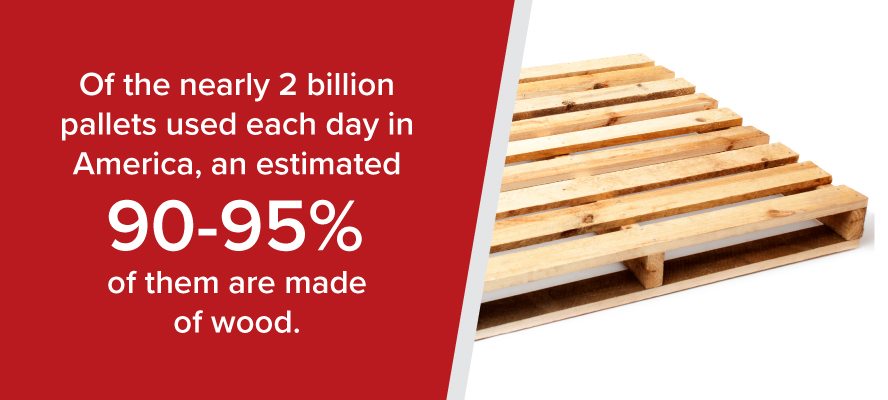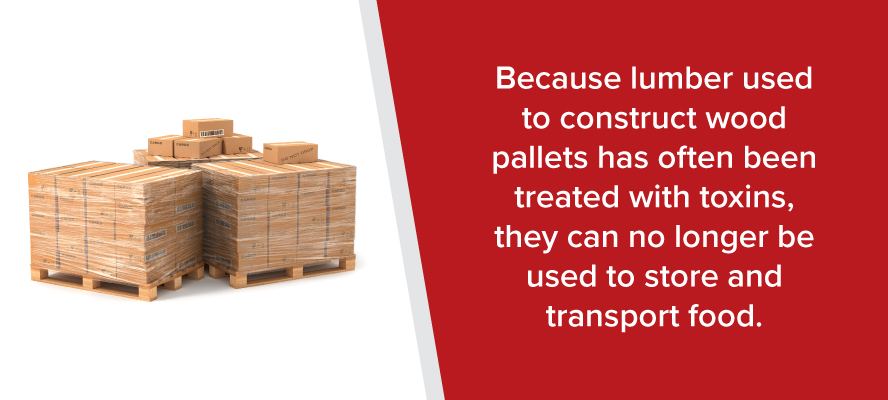Are Wood Pallets a Food and Drug Safety Risk?
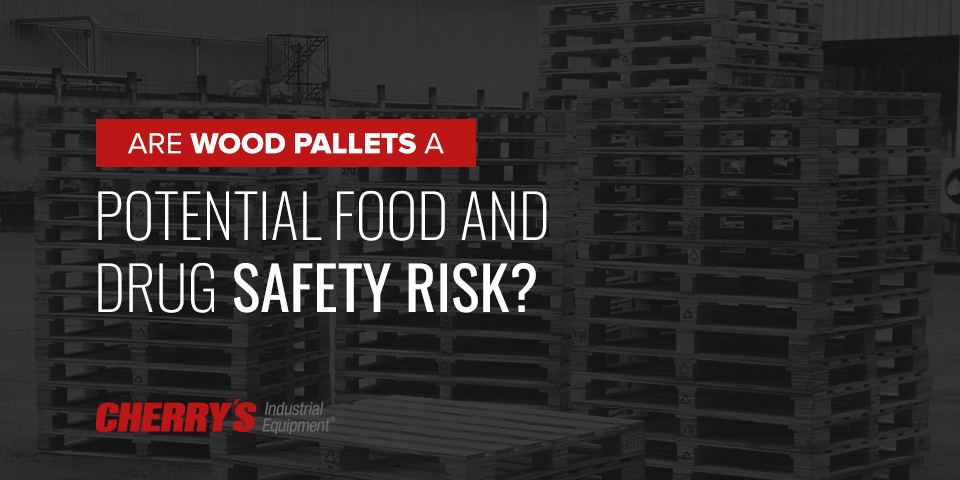
Food and pharmaceutical distribution companies across the nation are switching their pallet supply from wood to plastic. While wood pallets have long been a mainstay of the shipping industry, new federal regulations require that all companies handling food and drug products remove old wood pallets from their supply chain and go with a sanitary alternative. That’s because the Food and Drug Administration (FDA) has found serious risks associated with wood pallet food safety.
To prevent foodborne illnesses, mitigate consumer health threats and protect your company against costly recalls, lawsuits and fines, it’s necessary to convert from wood pallets to sanitary plastic ones. Unfortunately, many companies aren’t aware of the full scope of risks associated with wood pallets and the important benefits of using plastic. Cherry’s Industrial is a leading expert in supply chain management solutions and modern-day industrial best practices. If you use wood pallets in your food business, we’re here to guide you through understanding wood pallet safety risks and how to improve the health standards of your organization.
Wood vs. Plastic Pallets
Wood pallets used to be the industry standard for all shipping, warehousing and distribution activities. Many business operators have traditionally seen wood as the only viable pallet option. In fact, until recently many manufacturers and distributors have never even heard of plastic pallets.
Wood pallets are by far the most commonly circulated kind of pallet. Of the nearly 2 billion pallets used each day in America, an estimated 90% to 95% of them are made of wood. And roughly 40% of those wood pallets are used to ship and store food products.
So why do so many businesses use wood pallets? Wood pallets have certain advantages that many companies place high value on. However, plastic pallets are slowly being recognized as a superior alternative. And with government regulations in place mandating a switch over to sanitary materials, there are many reasons to consider the benefits of plastic pallets. With recent reports of major brands being involved in recalls and lawsuits, it’s vital for companies to start comparing the food safety of plastic vs. wood pallets.
Here’s a comparison between these two types of pallets and their impact on food safety.
Wood Pallets Pros and Cons
There are a variety of benefits to using wood pallets in your warehouse, most of which are economic.
Wood pallets have the following advantages:
- Lower cost: The major advantage businesses see in wood pallets is the cost-effectiveness. Wood pallets are affordable to purchase because they’re inexpensive to build. The average recycled wood pallet costs around $10 but is often less when purchased in bulk.
- Durability: Wood pallets are also durable and can make several trips through the supply chain without requiring any maintenance. When wood pallets do need repairs, they’re often easy fixes.
- Recyclability: Wood pallets can be taken apart and recycled into new wood pallets, which extends the material’s lifespan.
Despite the lower cost of investment, wood pallets have many qualities that make them a less-preferred — and sometimes even illegal — option for certain businesses and industries.
Wood pallets have the following disadvantages:
- Low quality standards: Many wood pallets today are constructed with low standards. The wood often splits, and the nails can easily become exposed, posing a serious safety risk to material handlers.
- Unsanitary material: Wood also attracts insects and fungi, which are then carried into your facility. If you’re handling food, it puts your sensitive cargo at risk of mold, fungal and bacterial exposure, which can have severe business repercussions.
- Food safety risks: The greatest disadvantage is the wood pallet food safety risk. Wood is a cellulose material that naturally absorbs moisture. When untreated or aging wood is exposed to water, it can trigger mold and bacteria growth.
Plastic Pallets Pros and Cons
Plastic pallets are quickly becoming the industry standard. With recent government regulations, businesses are switching over to plastic pallets — and for good reason. Plastic pallets are a superior pallet option and an important long-term business investment.
Plastic pallets offer the following advantages:
- Improved durability: Plastic pallets are highly durable and designed as a longer-lasting alternative to wood pallets.
- High-quality construction: Many plastic pallets are manufactured through a precise mold-injection process, which ensures high-quality construction.
- Eco-friendliness: Plastic pallets that are not specially made from virgin resin material can also be made from recycled plastic. Both types of pallets are 100% recyclable.
- Improved material handling efficiency and warehouse organization: Plastic pallets are also efficient components in the supply chain and warehouse management. Many types of plastic pallets are nestable — features that wood pallets can’t claim due to their design. These space-saving features make plastic pallets a great asset to warehouse organization.
- Enhanced worker safety: Plastic pallets also create a safer environment by protecting workers from exposure to sharp edges and nails.
- Food safety compliance: The most important advantage plastic pallets offer to food handling companies is their food safety certifications. Plastic pallets are compliant with the recent Food Safety Modernization Act (FSMA) and other food- and drug-related safety standards. Recycled plastic is food-safe and doesn’t harbor mold, fungi, bacteria or insects like wood pallets do.
Despite the many benefits of plastic pallets, there are some drawbacks to using them in your warehouse, including:
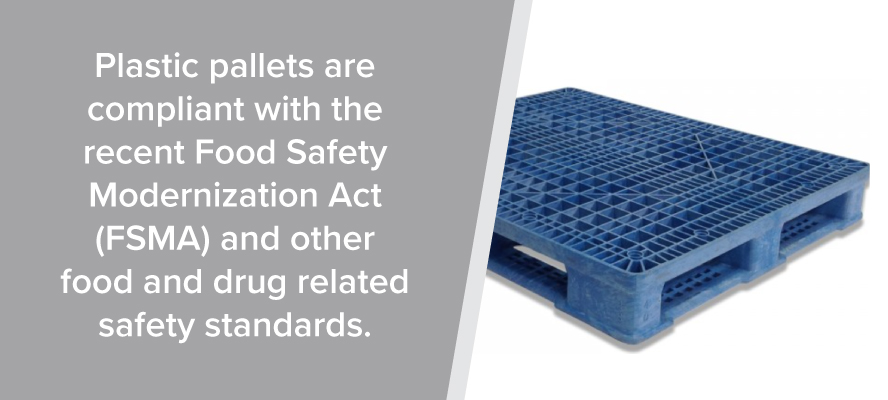
- Higher cost of investment: Plastic pallets are more expensive to purchase initially compared to wood pallets. But the durability, longevity and efficiency they add to your warehouse will earn you a massive return on investment that’s incomparable to wood pallets.
- Shipping complexities: Some companies find it difficult to manage plastic pallets in their shipping endeavors, as they can be lost during the transportation process.
The Dangers of Wood Pallets
If you’re shipping bulk items, it’s important to know the dangers involved in using wood pallets. Though they may be cost-effective, wood pallets can do more harm than good. Many companies have learned this the hard way, which is why they’ve begun their search for alternative pallet options.
If you’re looking into wood pallet alternatives but aren’t sure whether it’s worth your investment, consider the following dangers of wood pallets:
- Worker safety: One of the immediate dangers of wood pallets is the threat to worker safety. Wood pallets have rough edges that are prone to splintering and causing slivers. Additionally, poorly constructed wood pallets often have exposed nails, which can puncture the skin.
- Product damage: As wood pallets age, they can become brittle making it easy for the wood slats to break and pierce product as it is being transported by a fork lift truck. If for example bagged product was resting on the wood pallet you not only would the bag be pierced but the purity of the contents within that bag would be compromised.

- Cleanliness: Another danger of wood pallets is the sanitation risk they pose. If you operate a sterile facility, your wood pallets can track in debris and bugs, compromising the hygiene of your warehouse.
- Food safety: One of the major concerns today around wood pallets is their threat to food safety. With the potential risk of harboring harmful bacteria and toxins, the dangers of using wood pallets in food distribution businesses are far too high.
The federal government implemented FSMA in response to the dangers of wood pallets. It’s important that all food and drug business managers fully understand the food safety risks of wood pallets so that they can mitigate cases of consumer illness and the subsequent financial costs associated with these incidents.
Wood Pallet Food Safety Risks
In the past 30 years, growing awareness around food safety has prompted major overhauls of health and safety standards in the food distribution industry. Because of this increased awareness, the industry has tightened its standards and protocols to put consumer health at the forefront of operations.
In more recent years, there have been growing concerns over the possible health risks posed by wood pallets. Federal agencies such as the FDA and the Centers for Disease Control and Prevention (CDC) have taken it upon themselves to research and monitor the correlation between wood pallets, food safety and consumer health.
A study conducted by the FDA concluded that one in 10 pallets contains harmful bacteria like E. coli and salmonella. Independent laboratory tests on wood pallets found they contained harmful bacteria, including listeria. While the chances of ingesting food contaminated by these bacteria are low, these aren’t risks anyone is willing to take. The CDC reports that foodborne  illnesses affect one in six Americans each year, and 128,000 individuals are hospitalized annually because of foodborne illnesses. Sadly, there are 3,000 fatalities each year due to foodborne illness.
illnesses affect one in six Americans each year, and 128,000 individuals are hospitalized annually because of foodborne illnesses. Sadly, there are 3,000 fatalities each year due to foodborne illness.
The key to managing foodborne illness is prevention. That’s why many companies have issued recalls on products like peanut butter, meat, frozen chicken and even pet food. Food distributors understand the massive financial penalties involved should any customers become ill due to contaminated wood pallets.
If you’re still wondering if wood pallets are safe for transporting food, the short and “to the point” answer is no. There are many potential food safety risks associated with wood pallets. According to the FDA, these wood pallet food safety risks come from three primary sources: filth, decomposition and unsanitary conditions.
Wood pallets aren’t usually treated with the same care and attention that plastic pallets receive. They’re often thrown into piles on the ground or in the dirt. They can easily accumulate filth and grime. Unlike plastic pallets, it’s difficult to clean and sanitize wood pallets. The less wood pallets are cared for, the quicker they will decompose. Decomposing wood is attractive to fungi and insects that are known carriers of disease and bacteria. Once they’ve infested a wood pallet supply, you can safely consider it contaminated.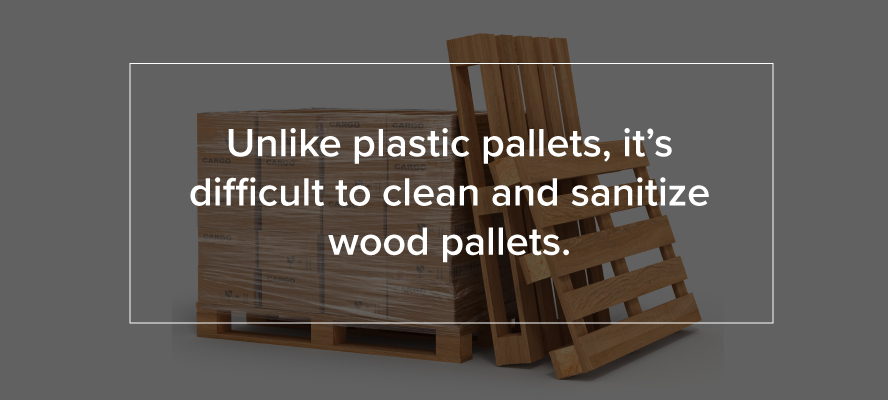
Wood pallets have also shown to contain fungicides, pesticides and other harmful chemicals. There’s a risk for these chemicals to become cross-contaminated with products. This is especially concerning where contaminated wood pallets are carrying pharmaceuticals.
Wood Pallet Safety Risks for the Pharmaceutical Industry
Unfortunately, wood pallets don’t just pose a health risk to food safety. The same health risks that are present with food loads are also present with pharmaceutical loads. However, wood pallet drug safety risks are especially concerning for public health officials. This is because the nature of pharmaceutical consumption is that those who are taking drugs are typically seniors and people who are already ill with compromised immune systems. Therefore, the risk of severe illness or fatality could be much higher.
An example of wood pallets compromising drug safety is a case from 2010 involving Tylenol. Thousands of bottles of Tylenol’s Arthritis Pain caplets were recalled when customers reported experiencing stomach pain, diarrhea and vomiting. The customers also reported that the caplets had a musty odor. This prompted Tylenol to investigate the cause of contamination. They traced it back to a fungicide product used on the wood pallets the pills were shipped on. When this particular fungicide interacts with moisture, it causes a chemical reaction, which is what ended up contaminating the Tylenol products.
Many people had to suffer unpleasant symptoms and were at risk of illness before these dangers were addressed. Thankfully, we now have important preventative regulations in place that eliminate the risks of food and drug contamination due to wood pallets.
Food and Drug Safety Regulations
Public health is at the core of American business standards. Prioritizing food and drug safety is essential to protecting consumers and preventing enormous financial and legal consequences. That’s why the federal government developed regulations designed to protect consumers and improve health and safety standards across the open market.
The FDA and USDA have their own sets of evolving health and safety requirements that businesses must comply with. But until recently, there had never been any regulations specifically addressing the use of wood pallets for food transportation. On January 4, 2011, President Barack Obama signed the Food Safety Modernization Act into law.
The FSMA is a group of regulations under the FDA intended to prevent food and drug contamination. This is a distinct shift from the usual manner of handling food contamination. Historically, businesses would simply react and respond to cases of foodborne illness whenever they came up. There wasn’t a widespread culture of prevention around food safety. With the enactment of FSMA, food and drug distributors have a legal obligation to prevent contamination. It has effectively made prevention a priority of operational standards and policies within this industry.
There are many regulations under the FSMA, which is divided up into seven main sections. According to the FSMA, food and drug distributors have a responsibility to ensure drugs and human or animal food are not stored or transported on wood pallets that have been treated with certain chemicals or are at risk of contamination.
Under FSMA regulations, food and drug handling companies must ensure their products are stored and transported on pallets that meet specific requirements. To comply with these regulations, your FSMA pallets need to meet the following criteria:
- Cleanliness: As mentioned, it’s difficult to keep wood pallets clean and almost impossible to fully sanitize them. That’s why companies are switching to alternative pallet materials, like recycled plastic. They’re easy to rinse off, wash, sanitize, dry and store.
- Toxin-free: Because lumber used to construct wood pallets has often been treated with toxins, these pallets can no longer be used to store and transport food. Instead, companies must use material that’s been rated as non-toxic and approved by the FDA.
- Maintenance: Before FSMA, there were no specific rules about the required state of pallets. This allowed poorly maintained pallets to circulate widely without thought to the potential health consequences. Now, the FDA has mandated that all pallets used to store and transport food and drugs be in good repair. Businesses can absolutely achieve this standard without worry when they use durable, industrial-grade plastic pallets.
It’s critical for businesses to make a plan to switch over their pallet inventory to FSMA pallets. The FDA is actively visiting and inspecting food- and drug-related companies to ensure compliance with FSMA. Failure to meet FSMA rules can result in criminal liabilities that have serious financial consequences as well as the possibility of imprisonment.
All business owners and operations executives must educate themselves on the FSMA rules. They must also immediately bring their practices up to speed with these regulations. For more information on FSMA, visit the Food Safety Modernization Act section of the FDA’s official website.
Plastic Pallets: A Safe and Sanitary Solution
The best way to meet FSMA regulations is to convert to plastic pallets. Using plastic pallets ensures increased compliance with all FSMA requirements for food storage and transportation. Where wood pallets fall short, plastic pallets are there to solve your food safety concerns. When you use plastic pallets, you significantly reduce the risk of cross-contamination and harboring foodborne illnesses in your distribution chain. You also eliminate the danger of transferring toxins from your pallets to your produce, drugs, meat or other sensitive products.
Plastic pallets also make excellent business sense in that they earn a great return on investment due to their longevity and durability. Plastic pallets also significantly improve warehouse efficiency and organization. Unlike wood pallets, plastic pallets offer a variety of features and applications to meet your unique business needs.
Cherry’s Industrial is a lead supplier of FSMA certified pallets. Our high-quality plastic pallets meet all FDA, USDA and Hazard Analysis and Critical Control Point (HACCP) regulations. We only work with the world’s finest plastic pallet manufacturers like Polymer Solutions, ORBIS, Craemer, Stratis and more. Our knowledgeable product specialists can help you choose the best plastic pallet solutions for your food or drug handling business.
Here’s a review of the sanitary benefits of plastic pallets and how they can improve your business operations:
- Meeting FSMA compliance: Every pallet that Cherry’s Industrial carries meets the latest FSMA regulations. All plastic pallets are made from 100% recycled plastic or structural foam materials. These materials include high-density polyethylene (HDPE) and polypropylene. Our plastic pallets are also non-toxic.
- Easy cleaning: One of the biggest benefits of our FMSA compliant pallets is that they’re easy to clean. Using a pallet washer and drying system, you can quickly sanitize your pallets and get them back into circulation. This improves warehouse efficiency while upholding sanitation standards.
- Long pallet life cycle: Plastic pallets from Cherry’s Industrial are built to last. Unlike wood pallets that become brittle over time, plastic pallets are highly durable and can serve a long life cycle that more than pays off their initial investment value.
- Maximized warehouse space: When switching over to plastic pallets, many businesses found new benefits they hadn’t previously thought of. For example, certain plastic pallets have a nestable design, meaning they’re designed to securely fit onto or into each other for space maximization. Our rackable plastic pallets are robust and designed to handle loads while stored on either selective or edge racks. Please speak with one of our product specialists to confirm which plastic pallets are considered edge rackable.
- Reduced product damage: Older wood pallets are prone to breaking and splitting. This can potentially compromise your products during transportation or even when being moved about the warehouse. Using durable and high-quality plastic pallets is the best way to mitigate the risk of product damage.
- Reduced chance of virus and disease transmission: Wooden pallets retain moisture and contain tiny pores and crevices that can harbor viruses, but the smooth surfaces of plastic pallets are bacteria-resistant and easy to disinfect.
These are just a few of the benefits plastic pallets can offer your food distribution or processing company. Remember that whether you’re a food and drug processor, shipper, receiver or carrier, you’re required to comply with FSMA regulations. To do this, you need to ensure you’re using FSMA pallets. Contact Cherry’s Industrial Solutions for more information on how to make the switch over to plastic pallets.
Sanitary Plastic Pallets From Cherry’s Industrial
If you operate a food or pharmaceutical distribution company, it’s time to make the switch to sanitary plastic pallets. These wood alternatives help you update your food safety procedures and comply with all government regulations. Plastic pallets are a smart business investment that improve warehouse efficiency and prevent product damage. Plus, they ensure you remain competitive in an increasingly tight marketplace.
Cherry’s Industrial Equipment is here to help you convert to plastic pallets so you can modernize your distribution chain. We offer a wide selection of plastic pallets to meet your load capacity needs. We also provide pallet-related equipment such as the PSR and VBED models of pallet retrievers, pallet inverters and stretch wrappers. To ensure your plastic pallets remain sanitary, Cherry’s Industrial can also supply you with pallet washers and dryers. Contact Cherry’s Industrial Equipment today for more information or for help placing your order for sanitary plastic pallets.
